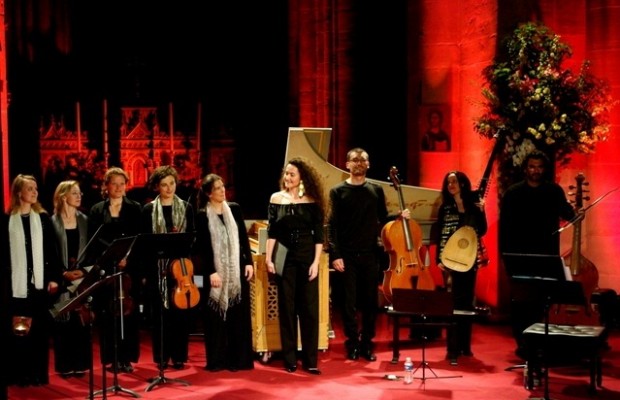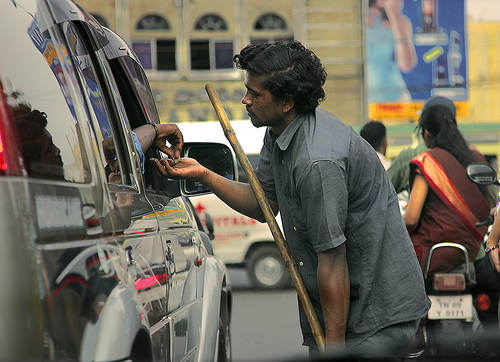Jatin Sharma is annoyed by beggars who play on his emotions to make money, instead of looking for honest work.
 Begging was once a destiny. Now it’s a profession – it’s a chosen way of life, for all the shameful (and shameless) ones who are lazy in life.
Begging was once a destiny. Now it’s a profession – it’s a chosen way of life, for all the shameful (and shameless) ones who are lazy in life.
A long time ago, Mumbai was fortunate to have real beggars, who gave you blessings, who were grateful for your help, who were really laachar and bebas. But not any more. Nowadays, when I look at beggars, I don’t see people I want to help. I see people I want to avoid, run away from because they are so utterly irritating. They desensitise every emotion in me; or maybe it is because I cannot, or don’t want to, feel another man’s pain any more.
I strictly feel that all the beggars from the city should be banned and at least in Mumbai we should act on those who beg, because begging really is illegal. For those who think I am being both brutal and politically incorrect, I would only like to say: pick a beggar and observe him/her for a week. Then you will understand how organised the entire process of begging is.
This has nothing to do with me being born in a better family and having more opportunity than other, less fortunate ones. Yes, I agree that these beggars didn’t get a good life like me, but that doesn’t mean that the rest of their lives should continue to be devoid of opportunity. If we continue to feel bad for them, they will continue to be beggars. Our pity is their salary.
Secondly, I have met several beggars in Mumbai and I have come to a conclusion: they are beggars not because God wants them to be, but because they want to be.
In Mumbai, no man who is willing to work will beg. And even if he has to beg – some people are victims of circumstance, being swindled out of all their money, or being abandoned by family in their old age, to state just two reasons – at least he should not irritate my city and her visitors from outside. The so-called beggars of my city are a disgrace to the financial capital of my country. And no, I don’t think that there are any individual beggars in the city, they work as a part of a larger mafia now.
They have taken over every traffic signal, every religious place and every transport station, and have slowly taken over the city. They approach people with bandaged hands that are soaked in red-coloured water, they rub their saliva on their faces to pass it off as tears, and touch people’s feet not to arouse pity in them, but a feeling of revulsion and annoyance, so that they get some money.
Take the example of the Gateway of India beggars. Most of them, exposed as they are to the constant barrage of foreign tourists thronging the site, can speak English, a smattering of French, and several other languages. They can almost correctly guess the nationalities of the visitors and have designed their begging strategies accordingly – one of which is to allot areas to people fluent in a language spoken by the foreigners most likely to frequent that area. Tell me, for a person clever enough to pick up a formal language without formal training, is it so difficult to use that cleverness in an honest trade and make honest money? Why is such a person still begging?
Begging has now evolved into a fine art. In fact, beggars are so organised and their work so scientifically carried out, I wouldn’t be surprised if a contingent of beggars was not some day invited to lecture B-students about efficiency and marketing themselves.
It’s not begging any more. Little children, unwashed and sometimes physically deformed, come up to you and ask for food. The moment you give them food, they go and sell it! Some of them are emphatic that they want money, not food, so that they can go buy some chemical to sniff at and get high, or else do cheap drugs with other children their age. Most children have to surrender the money they make from begging to a common pool each evening, from which he/she gets an equal share as allotted by the dada that controls them.
Nobody says much against them, because in India, we are an emotional lot. And we have let this menace of begging get out of hand; we have allowed it to become an organised, well-paying activity that is both demeaning and exploitative. While we have been quick to protest against the evils of drinking or prostitution, we have not been as strict with begging. As a developing country, we should be ashamed that so many of our countrymen are beggars, that so many of our young children are street urchins with no present and not much hope at a future. We hear cases of parents pushing their children out of their homes to beg – what do we do after hearing these stories?
And why would we? At the risk of sounding really harsh, let me say that at some point in all our lives, we have all begged – begged with police officers to forgive our mistakes, begged with teachers to give us grace marks and pass us, begged to be promoted, begged for another chance…begged and begged again. We excel at playing the victim card repeatedly, just to get what we want, and if we have to beg to do it, we will. Heck, we even use the term ‘beg, borrow, steal’ really easily in our normal conversation, sometimes in front of our impressionable children.
What really stops us, a country that supplies a lot of labour and technology to the rest of the world, from taking a stand? Do we lack the spine for it? Do we not have the power to set things right? Is it because we accord emotions the first priority in everything?
Is this what makes us let the beggars be, the politicians continue to scam unabated, let the country run the way it is being run? Or is it because we are too afraid to let new thoughts, however radical or tough, come to life and breathe?
Let your new thoughts take seed and grow. Don’t give out largesse to someone just because he/she makes a sad face and asks for it. Don’t pay these actors on the roads. Avoid. Ignore. And ban!
Jatin Sharma is a media professional who doesn’t want to grow up, because if he grows up, he will be like everybody else.
(Picture courtesy rottenview.blogspot.com)







